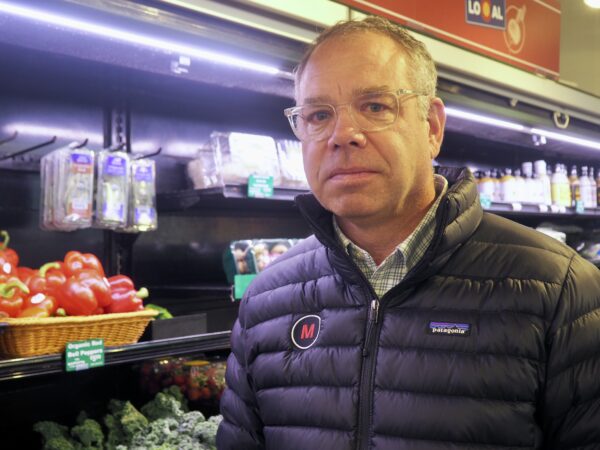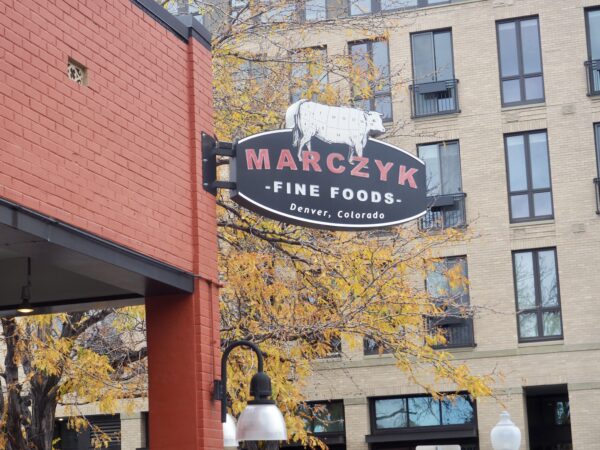
Pete Marczyk inside of his store on November 4th. (Matt Geiger/BusinessDen)
Pete Marczyk is fed up with Denver’s “culture of permissiveness.”
“It doesn’t seem like there’s much reason for people to not shoplift. I mean, we just have to depend on the kindness of strangers to not do it,” said Marczyk, who owns Marczyk’s Fine Foods.
The store, open since 2002, has two locations. The original spot at 770 E. 17th Ave. in Uptown gets stolen from at least three or four times a week, Marcyzk said. His second location at 5100 E. Colfax Ave. gets hit at least once or twice a week.
That’s up from just once or twice a month before the pandemic hit.
And shoplifters, Marcyzk said, are like mice. If you see one, you probably have more you don’t know about.
“We have wrestled people to the ground,” the 58-year-old said.
Before the pandemic, Marczyk said it was common for there to be “beat cops” who would stop in several times a week. Their presence, he said, was a huge deterrent to crime.
Now, Marczyk said, no one is stopping in. And he doesn’t think it’s even worth calling 911.
“When we do call, unless there’s physical violence involved, or threats of violence, they just are not going to show up,” Marczyk said. “They just don’t have the time.”
He points to the department’s decision in May to limit the amount of enforcement of low-level traffic violations, like expired license plates, as evidence that Denver police are not interested in addressing smaller matters.
Marczyk declined to share dollar amounts of material being stolen, but said in an industry where sub-5 percent profit margins are common, a few items being taken has big impacts. He employs 90 people between his two stores and warehouse in Park Hill.
Most who steal from him are trying to get something to eat, Marczyk said, so items such as cheese and cooked fish, are more prone to be taken.
And while he has chased down thieves personally, it’s not something he asks of his staff.
“I absolutely do not want my people doing that,” he said. “In no way do I want any of my cashiers running after a person.”
When contacted for comment, Sgt. Jay Casillas said in an email to BusinessDen that the Denver Police Department “responds to ALL calls for service.”
“Officers will enforce laws when the victim wishes to prosecute and there is probable cause and evidence to support an arrest/citation,” Casillas said. “Our investigations team will follow up on leads, share information across district and jurisdictional boundaries to identify and hold those responsible for committing the act accountable. It is very important for the community to report specific incidents to us, so that we can properly allocate resources and build viable crime-prevention strategies to mitigate that crime.”
Shoplifting anything in Colorado between $300 and $2,000 is a misdemeanor. Stealing less than $300, which represents pretty much all shoplifters at Marczyk’s, is a simple petty offense.
“They’re not walking out with carts of groceries in our store, that’s for sure,” the grocer said.
Told of Casillas’ comments, Marczyk said he plans to start filing police reports. But if the shoplifter has already left the store, there’s little he expects police to be able to do.
“They’re not going to go hunt someone down with a picture,” Marczyk said.
Theft means Marczyk’s automated inventory service, which tells him when he’s running low on something, sometimes shows him as having more product in store than he really does — because the service only accounts for sales.
He tries to deter crime through his “EGG” strategy — everybody gets a greeting — in an attempt to eliminate the shoplifter’s anonymity.
“Just the cashier saying ‘Hi’ on your way in, and the meat guys saying, ‘How can I help you?’ The produce person saying, ‘What’s for dinner tonight?’ People are going to squeeze out like watermelon seeds on that,” Marczyk said.
It’s not just him who is facing this challenge, though. Down the street at 17th and Park Avenue, Robin Lohre, who owns gift shop Talulah Jones, said she gets stolen from pretty every day.

Inside the Talulah Jones shop on 17th. (Matt Geiger/BusinessDen)
“It is disheartening and demoralizing … Pete and I are like anchors on 17th,” she said.
Lohre said business has been down 20 percent in the past two years. Spending more time keeping an eye on suspicious customers, such as by following them around the store, means she has less time for business-related tasks like organizing the shop’s backroom. She’s shocked by the entitlement of those who steal from her, especially considering that all she sells are knick knacks and cute gifts.
Lohre said one thief she caught told her: “I’m being respectful. This is the first time I’ve hit you.”
Lohre and Marczyk attended a meeting with about 40 other business owners and Mayor Mike Johnston last week. Many in attendance spoke up about their challenges with shoplifting, the pair said.
At one point, Johnston touted that the city had seen a 30 percent decrease in petty crime.
“Everybody pounced on that,” Lohre said, since people have stopped bothering filing police reports that they see as futile.
The two business owners stressed their support for the police, which is precisely the reason why they want to see more officers. For Marczyk, that means putting more officers on the street to deter crime. For Lohre, it means quicker response times and more severe penalties for shoplifting. She sometimes is on hold for 10 minutes with the cops.
“The short-term solution to me is you get some cops on the street checking doors, old school,” Marczyk said.

Outside Marczyk’s 17th Avenue location. (Matt Geiger/BusinessDen)

Pete Marczyk inside of his store on November 4th. (Matt Geiger/BusinessDen)
Pete Marczyk is fed up with Denver’s “culture of permissiveness.”
“It doesn’t seem like there’s much reason for people to not shoplift. I mean, we just have to depend on the kindness of strangers to not do it,” said Marczyk, who owns Marczyk’s Fine Foods.
The store, open since 2002, has two locations. The original spot at 770 E. 17th Ave. in Uptown gets stolen from at least three or four times a week, Marcyzk said. His second location at 5100 E. Colfax Ave. gets hit at least once or twice a week.
That’s up from just once or twice a month before the pandemic hit.
And shoplifters, Marcyzk said, are like mice. If you see one, you probably have more you don’t know about.
“We have wrestled people to the ground,” the 58-year-old said.
Before the pandemic, Marczyk said it was common for there to be “beat cops” who would stop in several times a week. Their presence, he said, was a huge deterrent to crime.
Now, Marczyk said, no one is stopping in. And he doesn’t think it’s even worth calling 911.
“When we do call, unless there’s physical violence involved, or threats of violence, they just are not going to show up,” Marczyk said. “They just don’t have the time.”
He points to the department’s decision in May to limit the amount of enforcement of low-level traffic violations, like expired license plates, as evidence that Denver police are not interested in addressing smaller matters.
Marczyk declined to share dollar amounts of material being stolen, but said in an industry where sub-5 percent profit margins are common, a few items being taken has big impacts. He employs 90 people between his two stores and warehouse in Park Hill.
Most who steal from him are trying to get something to eat, Marczyk said, so items such as cheese and cooked fish, are more prone to be taken.
And while he has chased down thieves personally, it’s not something he asks of his staff.
“I absolutely do not want my people doing that,” he said. “In no way do I want any of my cashiers running after a person.”
When contacted for comment, Sgt. Jay Casillas said in an email to BusinessDen that the Denver Police Department “responds to ALL calls for service.”
“Officers will enforce laws when the victim wishes to prosecute and there is probable cause and evidence to support an arrest/citation,” Casillas said. “Our investigations team will follow up on leads, share information across district and jurisdictional boundaries to identify and hold those responsible for committing the act accountable. It is very important for the community to report specific incidents to us, so that we can properly allocate resources and build viable crime-prevention strategies to mitigate that crime.”
Shoplifting anything in Colorado between $300 and $2,000 is a misdemeanor. Stealing less than $300, which represents pretty much all shoplifters at Marczyk’s, is a simple petty offense.
“They’re not walking out with carts of groceries in our store, that’s for sure,” the grocer said.
Told of Casillas’ comments, Marczyk said he plans to start filing police reports. But if the shoplifter has already left the store, there’s little he expects police to be able to do.
“They’re not going to go hunt someone down with a picture,” Marczyk said.
Theft means Marczyk’s automated inventory service, which tells him when he’s running low on something, sometimes shows him as having more product in store than he really does — because the service only accounts for sales.
He tries to deter crime through his “EGG” strategy — everybody gets a greeting — in an attempt to eliminate the shoplifter’s anonymity.
“Just the cashier saying ‘Hi’ on your way in, and the meat guys saying, ‘How can I help you?’ The produce person saying, ‘What’s for dinner tonight?’ People are going to squeeze out like watermelon seeds on that,” Marczyk said.
It’s not just him who is facing this challenge, though. Down the street at 17th and Park Avenue, Robin Lohre, who owns gift shop Talulah Jones, said she gets stolen from pretty every day.

Inside the Talulah Jones shop on 17th. (Matt Geiger/BusinessDen)
“It is disheartening and demoralizing … Pete and I are like anchors on 17th,” she said.
Lohre said business has been down 20 percent in the past two years. Spending more time keeping an eye on suspicious customers, such as by following them around the store, means she has less time for business-related tasks like organizing the shop’s backroom. She’s shocked by the entitlement of those who steal from her, especially considering that all she sells are knick knacks and cute gifts.
Lohre said one thief she caught told her: “I’m being respectful. This is the first time I’ve hit you.”
Lohre and Marczyk attended a meeting with about 40 other business owners and Mayor Mike Johnston last week. Many in attendance spoke up about their challenges with shoplifting, the pair said.
At one point, Johnston touted that the city had seen a 30 percent decrease in petty crime.
“Everybody pounced on that,” Lohre said, since people have stopped bothering filing police reports that they see as futile.
The two business owners stressed their support for the police, which is precisely the reason why they want to see more officers. For Marczyk, that means putting more officers on the street to deter crime. For Lohre, it means quicker response times and more severe penalties for shoplifting. She sometimes is on hold for 10 minutes with the cops.
“The short-term solution to me is you get some cops on the street checking doors, old school,” Marczyk said.

Outside Marczyk’s 17th Avenue location. (Matt Geiger/BusinessDen)


